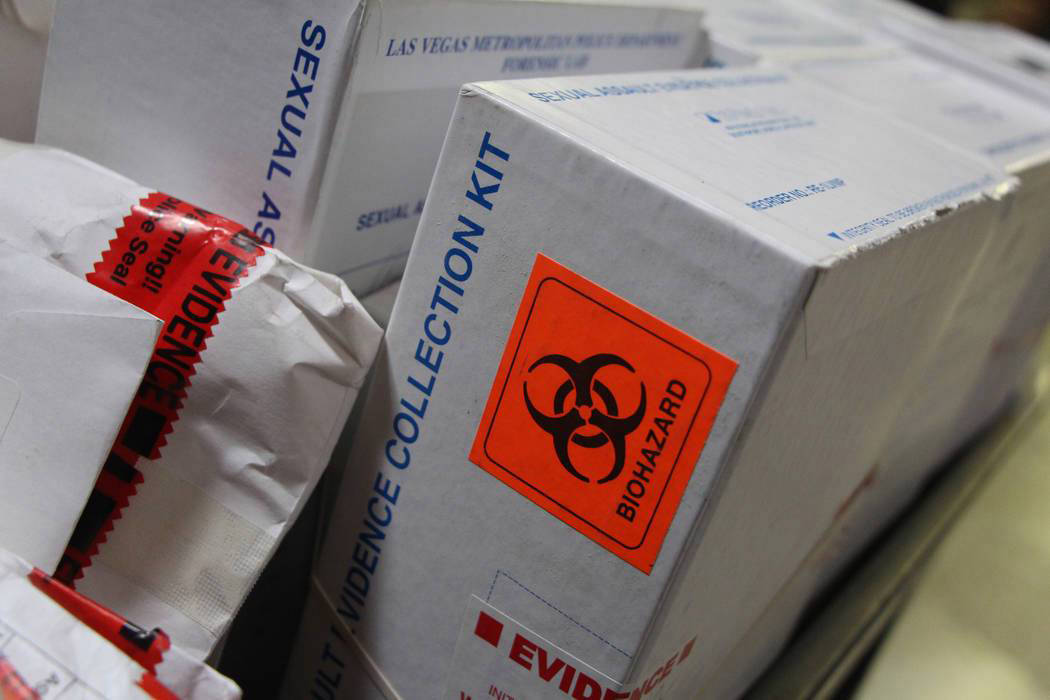Justice delayed, not denied: Nevada’s massive rape kit backlog cleared

In late 2014, through a political fellowship, then-Sen. Aaron Ford was informed about a nationwide problem: massive — and growing — backlogs of untested rape kits.
Ford returned home to Nevada, and, bothered by what he’d learned, began looking into the state’s sexual assault kits.
“Lo and behold, we were 8,000 or so behind,” Ford, now Nevada attorney general, recalled in an interview this week with the Las Vegas Review-Journal.
So Ford and his fellow lawmakers got to work, and by the next fall, former Attorney General Adam Laxalt had announced a statewide initiative to test the thousands of DNA kits sitting unopened in police fridges and files across Nevada for as long as 30 years. At the time, the director of forensic laboratory services for Las Vegas police had estimated the backlog in Southern Nevada alone was equal to about 63 years worth of work.
Now, roughly six years later, as the top law enforcement officer in the state, Ford helped push this initiative over the finish line.
This month, Nevada’s backlog of at least 7,855 untested rape kits — performed between 1985 and 2016 — was officially cleared.
“It’s a very good day for the state, but more importantly, it’s a very good day for all the survivors who’ve been waiting up to this point to have their rape kits tested,” Ford said.
It was a massive undertaking, backed by $15 million total in federal grants and state funding, that led to the establishment of Nevada’s Sexual Assault Kit Backlog Working Group and legislation that now requires law enforcement in Nevada to send rape kits for testing within 30 days and forensic labs to complete testing within 120 days.
‘A voice to the evidence’
Southern Nevada’s backlog, which accounted for about 85 percent of the state’s untested kits, was cleared last April. That left roughly 1,100 kits in Northern Nevada to be tested, and despite some setbacks due to the COVID-19 pandemic, the Washoe County Sheriff’s Office concluded testing on the remaining rape kits this month.
“It was an incredible amount of work,” said Kerri Heward, director of the forensic science division for the Sheriff’s Office, noting that her office also is responsible for rape kits collected in 13 counties spanning the northern and central portions of the state.
Heward added: “We like to say we give a voice to the evidence.”
As a result of the yearslong testing initiative, across the state, more than 60 arrests have been made and more than 120 arrest warrants issued as of this week, according to the attorney general’s office.
Among those arrested was Ramon Muril Dorado, a 48-year-old felon convicted of burglary, grand larceny and possession of a stolen vehicle, and whose criminal history in Clark County dates to at least 2007.
Rape kit testing identified Dorado as a suspect in an April 1999 rape in Las Vegas, and in 2017, he pleaded guilty to three counts of sexual assault. A judge sentenced him to life in prison with the possibility of parole after 30 years, according to court records.
“That is a perfect example of justice delayed, but in this instance, not denied,” Ford said.
Sending a message
Reasons behind rape kit backlogs are complex, but the national issue has been blamed on a lack of training, resources and policies that outline when to test rape kits.
While there is no data available for the number of untested rape kits nationwide, according to the National Institute of Justice, it is estimated that hundreds of thousands of untested kits are stored in police evidence rooms, crime labs, hospitals and clinics across the country.
And when those kits go untested, assailants can strike again.
In one Clark County case, a 57-year-old felon, with a lengthy criminal history in Nevada, struck at least twice between May 2000 and February 2014.
It wasn’t until 2018 that the perpetrator in those cases was identified as Luther Earl Walker, according to court documents, after the victims’ DNA kits were sent for testing.
Walker pleaded guilty in both cases and was sentenced in February to 16 to 40 years in a state prison.
“In pursuing this initiative,” said Monica Moazez, spokeswoman for the attorney general’s office, “it sends a message to survivors of sexual assault that we care, and that we’re invested in your livelihood. But it also sends a message to perpetrators of these assaults that your actions matter, too, and we’re watching.”
And if given the opportunity, if survivors choose to press charges, Moazez said, “We’re going to pursue justice.”
To learn more about Nevada’s sexual assault kit backlog and resources available to survivors, visit www.endnevadasbacklog.ag.nv.gov. The state-run website is updated monthly.
Contact Rio Lacanlale at rlacanlale@reviewjournal.com or 702-383-0381. Follow @riolacanlale on Twitter.